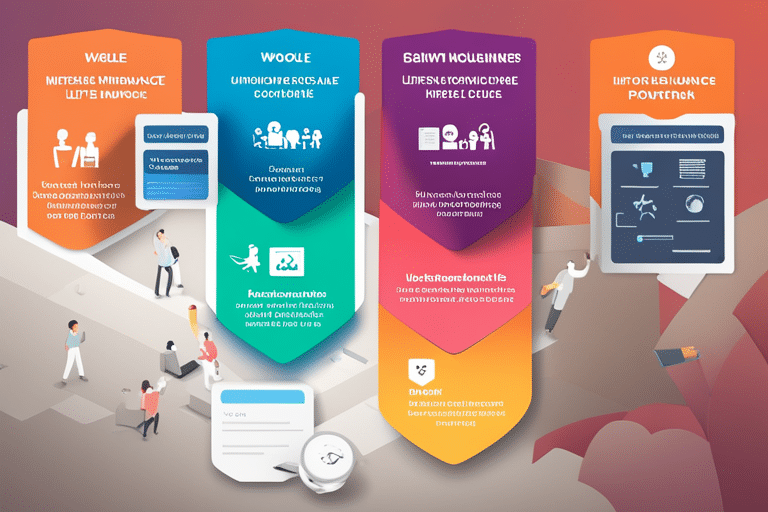Are you ready to embark on a journey that will unveil the hidden gems of life insurance? Get ready to discover the true value of this often misunderstood policy.
It’s time to break free from the shackles of misconceptions and explore the financial protection it provides. From evaluating long-term benefits to uncovering additional features and riders, we’ll delve into every aspect.
So buckle up, because this article is here to show you that life insurance is more than just a policy – it’s a game-changer!
Key Takeaways
- Life insurance provides financial security to loved ones and ensures they receive a lump sum payment upon the policyholder’s passing.
- It relieves the family from worrying about mortgage payments and mounting debts, allowing them to focus on healing and rebuilding their lives.
- Life insurance policies often come with tax benefits, providing more money to beneficiaries and protecting loved ones financially in unpredictable situations.
- Choosing the right life insurance policy requires evaluating individual needs and financial goals, seeking professional advice, and selecting a policy that aligns with personal circumstances and desired level of financial protection.
Understanding the Financial Protection Provided by Life Insurance

You might be wondering how life insurance can provide you with financial protection. Well, my friend, let me paint a picture for you.
Imagine your life as a beautiful garden full of blooming flowers and lush greenery. It’s a paradise, isn’t it? But what if a sudden storm comes and wreaks havoc on your garden? That’s where life insurance steps in to save the day.
Life insurance is like an umbrella that shields you from the financial storms that may come your way. It offers you the much-needed peace of mind by providing financial security to your loved ones when you’re no longer around. Just think about it – if something were to happen to you, how would your family cope financially? Bills still need to be paid, kids still need to go to school, and dreams still need to be pursued.
With life insurance, all these worries are taken care of. Your policy ensures that your family will receive a lump sum payment upon your passing, giving them the means to maintain their current lifestyle and plan for the future. They won’t have to worry about mortgage payments or mounting debts; instead, they can focus on healing and rebuilding their lives.
Now that we’ve established how life insurance provides financial security and peace of mind, let’s dive into evaluating its long-term benefits. Because understanding just how valuable this protection is can help ensure a brighter future for both you and your loved ones.
Evaluating the Long-Term Benefits of Life Insurance

When considering life insurance, it’s important to evaluate the long-term benefits of the policy. Life insurance isn’t just a piece of paper; it’s a safety net that can provide financial security for you and your loved ones. So, let’s dive in and explore why life insurance is more than just another expense.
-
Evaluating the cost effectiveness: Life insurance may seem like an additional monthly expense, but when you consider the potential payout and the peace of mind it brings, it becomes clear that it’s worth every penny. Think of it as an investment in your family’s future.
-
Understanding the tax benefits: Did you know that life insurance policies often come with tax benefits? Depending on where you live, the death benefit received by your beneficiaries may be tax-free. That means more money in their hands when they need it most.
-
Protecting your loved ones financially: Life is unpredictable, and none of us have a crystal ball to see what lies ahead. With a life insurance policy in place, you can ensure that your loved ones are financially protected even if something unexpected happens to you.
-
Leaving a legacy: Life insurance allows you to leave behind a lasting legacy for your family or favorite charitable causes. It can provide funds for education expenses, mortgage payments, or even support philanthropic endeavors close to your heart.
As you can see, evaluating the long-term benefits of life insurance goes beyond simply looking at numbers on a page. It’s about securing your family’s future and leaving behind a meaningful legacy.
Now that we’ve explored this aspect thoroughly, let’s move on to exploring the different types of life insurance policies available to help you make an informed decision.
Exploring the Different Types of Life Insurance Policies

So, you’ve decided it’s time to dive into the world of life insurance. But wait! Before you take the plunge, let’s talk about the different types of policies out there.
First up, we have Term Vs. Whole Life – two heavyweights in the insurance ring.
Then, we’ll break down Coverage Options Explained because who doesn’t love options?
And finally, we’ll guide you through the maze of Choosing the Right Policy because finding ‘the one’ can be as tricky as finding your soulmate (okay, maybe not that tricky).
Get ready for a crash course in all things life insurance!
Term Vs. Whole Life
If you’re unsure about which type of life insurance to choose, it’s important to compare the benefits of term and whole life policies. Let’s take a closer look at these options:
-
Term Life: This type of policy provides coverage for a specific period, usually 10, 20, or 30 years. It offers a higher death benefit at a lower premium cost.
-
Whole Life: On the other hand, whole life insurance provides lifelong coverage with an investment component. It accumulates cash value over time and can be used as a source of funds if needed.
Deciding between term and whole life insurance depends on your individual needs and financial goals. If you’re looking for affordable protection for a certain timeframe, term life may be the way to go. But if you want lifelong coverage with potential additional benefits, whole life might be more suitable.
Now that we’ve covered term vs. whole life insurance, let’s dive into understanding different coverage options explained in detail…
Coverage Options Explained
To better understand your coverage options, let’s explore the various types of policies available. Life insurance is not just a piece of paper; it’s a shield that protects you and your loved ones from life’s unexpected turns. Take a look at the table below to see how different policies can offer varying levels of security and benefits:
| Policy Type | Coverage Options | Policy Benefits |
|---|---|---|
| Term Life | Fixed term (e.g., 10, 20 years) | Lower premiums, temporary coverage |
| Whole Life | Lifetime coverage | Cash value accumulation, potential dividends |
| Universal Life | Flexible coverage options | Cash value growth potential, investment opportunities |
Each policy has its own unique advantages, so it’s important to choose the right one for you. Now that you know more about the different coverage options available, let’s dive into how to choose the perfect policy for your needs.
In this section about ‘choosing the right policy’, we will discuss key factors such as budget considerations and long-term goals to help you make an informed decision.
Choosing the Right Policy
When choosing the right policy for your needs, consider your budget and long-term goals to ensure you make an informed decision. Life insurance is more than just a piece of paper – it’s an investment in your peace of mind and financial security.
To help you navigate the world of life insurance, here are some key factors to consider:
-
Benefits comparison: Take a close look at the benefits offered by different policies. Consider factors like coverage amount, premium costs, and payout options.
-
Policy selection: Think about what type of policy aligns with your goals. Do you need term life insurance or whole life insurance? Assessing your needs will guide you towards the right choice.
-
Additional features: Some policies come with added perks like cash value accumulation or accelerated death benefits. Explore these features to see if they align with your long-term objectives.
-
Riders: Riders are optional add-ons that provide additional coverage for specific situations such as critical illness or disability. Consider whether any riders would be beneficial for you.
With these considerations in mind, let’s delve into uncovering the additional features and riders of life insurance.
Uncovering the Additional Features and Riders of Life Insurance

Life insurance offers a range of additional features and riders that can provide added benefits and flexibility. These extra components are like the sprinkles on top of a delicious ice cream sundae, making your life insurance policy even more sweet and satisfying.
Let’s dive into the world of these hidden gems and discover how they can enhance your coverage.
One popular type of rider is the accelerated death benefit rider, which allows you to receive a portion of your death benefit if you are diagnosed with a terminal illness. This not only provides financial support during a difficult time but also gives you peace of mind knowing that you have options when facing such challenges.
Another valuable rider is the waiver of premium rider. Imagine this: you’re cruising down a beautiful winding road, enjoying life to its fullest, when suddenly an unexpected disability strikes. With this rider in place, your premiums will be waived if you become disabled and unable to work. It’s like having an automatic umbrella that shields you from the stormy weather.
And let’s not forget about the accidental death benefit rider! This little gem ensures that if your untimely demise is caused by an accident rather than natural causes, your loved ones will receive an additional payout on top of the base policy amount. It’s like adding an extra layer of protection to keep them safe.
Examining the Role of Life Insurance in Estate Planning

Are you aware of the significant role life insurance plays in estate planning? Life insurance is not just a simple policy; it can be a valuable tool in ensuring your loved ones are taken care of after you’re gone.
When it comes to estate tax planning and wealth preservation, life insurance can offer unique benefits that go beyond its traditional purpose. Let’s take a closer look at how life insurance fits into your overall estate plan:
-
Estate Tax Planning: Life insurance proceeds are generally tax-free for the beneficiary, which means they can be used to cover any estate taxes that may arise upon your passing. This can help prevent your heirs from having to sell assets or dip into their inheritance to pay these taxes.
-
Wealth Preservation: By using life insurance strategically, you can preserve the wealth you’ve worked so hard to build. Instead of leaving behind liquid assets or property that could be subject to heavy taxation, you can designate the proceeds from a life insurance policy as an inheritance for your loved ones.
-
Liquidity: Life insurance provides immediate access to funds when they are needed most. This liquidity can be crucial in settling any outstanding debts or expenses associated with your estate, allowing your beneficiaries to receive their inheritance without delay.
-
Flexibility: With various types of policies available, such as whole life or universal life insurance, you have flexibility in tailoring your coverage to meet specific goals within your estate plan. Whether it’s providing income replacement for a surviving spouse or funding educational expenses for future generations, life insurance offers versatility.
Real-Life Stories: How Life Insurance Has Made a Difference

Using life insurance strategically has made a significant difference in the lives of many individuals. Let’s dive into some real-life examples to truly understand the impact it can have on beneficiaries.
Imagine this: you’re a young couple, just starting your family, when tragedy strikes and one of you passes away unexpectedly. Suddenly, everything becomes uncertain – how will you afford the mortgage? How will you provide for your children’s education? But thanks to a well-thought-out life insurance policy, these worries are alleviated. The financial burden is lifted, allowing your family to grieve without added stress. Life insurance steps in as a safety net, giving your loved ones the security they need during such difficult times.
Now let’s switch gears and talk about retirement planning. You’ve worked hard all your life and want to ensure that your golden years are worry-free. By incorporating life insurance into your retirement strategy, you create an additional source of income for yourself and your spouse. This means more flexibility in how you enjoy those well-deserved vacations or pursue new hobbies. Life insurance becomes an integral part of securing a comfortable future for both you and your partner.
These real-life stories illustrate just how impactful strategic life insurance can be for beneficiaries. It provides peace of mind during challenging moments while also offering financial stability for the future. So whether it’s protecting your family during unexpected events or securing a comfortable retirement, remember that life insurance is not just another policy – it’s a powerful tool that can transform lives!
Frequently Asked Questions
What Are the Different Factors That Determine the Financial Protection Provided by Life Insurance?
Life insurance provides financial protection by considering factors like your age, health, and coverage amount. It’s not just a policy, it’s peace of mind for you and your loved ones. Don’t wait to protect what matters most!
How Does Life Insurance Play a Role in Retirement Planning and Long-Term Financial Stability?
Life insurance plays a crucial role in retirement planning and achieving long-term financial stability. Imagine this: with life insurance, you can protect your retirement savings and ensure that your loved ones are financially secure even after you’re gone. It’s like having a safety net for your future!
Are There Any Specific Situations Where Term Life Insurance Is More Beneficial Than Whole Life Insurance?
When it comes to term life insurance vs whole life insurance, young families can benefit more from term life. It’s like the training wheels of insurance – provides protection without breaking the bank!
What Are Some Common Additional Features and Riders Available in Life Insurance Policies?
Life insurance policies offer additional features and policy riders to enhance coverage. These can include options like accelerated death benefit, disability income rider, and waiver of premium. They add value and flexibility to your policy.
Can Life Insurance Help With Estate Tax Planning and Preserving Wealth for Future Generations?
Life insurance can be a powerful tool for estate planning and preserving generational wealth. By utilizing the right policy, you can ensure your loved ones are financially secure for years to come.
Conclusion
So, you’ve reached the end of this enlightening journey about life insurance.
Now, let me leave you with one fascinating statistic that will surely make you go ‘wow!’ Did you know that according to a recent survey, 60% of Americans believe they need more life insurance?
That’s right! It just goes to show how important and valuable this financial protection can be.
So don’t wait any longer, take action now and secure your future with the true treasure that is life insurance.
Happy planning!

